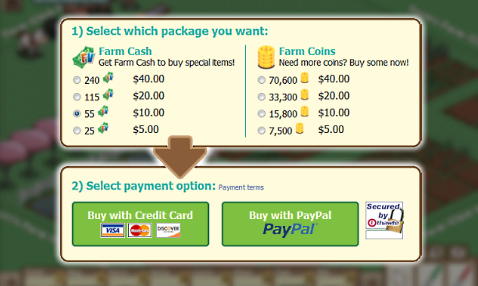Real cash for virtual cash: FarmVille's business sense

FarmVille has become of the most popular social game applications for Facebook for my generation, and the creators must be laughing in almost incomprehensible proportions at the millions they must be making.
The application is a simulation-based game that not only involves community spirit by other application users with gifts and extra tasks (which give the recipient farm coins to spend within their own game), but exploits the virtual cash ("farm coins") based marketplace for real money.
When a user accepts the game/application, you are presented with a blank canvas with which you are expected to create a virtual farm. You can plant seeds and they grow over time, and when you harvest the produce you receive farm coins, which perpetuate further spending.
Like other simulation games, you build up to different levels and can purchase more and more items - decorations, animals, trees and produce of higher wealth which then give a more substantial return. It's addictive and keeps you playing by offering the farm cash incentive.
I've been playing for only five days and the feedback received from the game in terms of farm cashflow, the experience level received and the number of neighbouring farms accepted (from other friends in my actual social network) all make the game quite addictive. It doesn't take up much of my time and constantly offers further advancement to a better farm.
It's pathetic that an online game has gripped me so much, but it's truly fantastic. But what has impressed me more is the business side behind the scenes of the game itself.
If you tried hard enough, you could earn your farm coins and farm cash through buying and selling of produce and animals. This would take you through weeks of repetitive tasks. The urge to bypass this laborious process and inject your own, real money into the game to convert into farm cash and coins is constantly playing on my mind.
Until I did. I spent $160 (£97) in the course of one hour just so I could expand my farm and further my game.
The interesting side is the real money vs. virtual money system. While this isn't a new concept, exploiting the popularity of the game and the exchange of real money for further tools, plants, crops and decorations would have no doubt gripped so many people - myself included.
The trick when generating games or applications such as these is the monetary remuneration. Nothing can be created for a truly free amount, therefore this system of money exchange has propelled Zynga, the creators of the game, into an entirely new dimension. The key fact here is that you don't have to spend money to further your advancement in the game, but if you do then you have the opportunity to fast track.
The temptation to spend money to engage with this cultural phenomenon is constant, for myself at very least.
My point is that if you are a budding entrepreneur and struggling to consider ways of gaining financial reward from the software you create, something like this should be taken away with you to the next developer meeting.
Business software could work on a pay-as-you-use-a-feature process - such as Word which restricted areas of the application to only the very basic functions. By linking in your credit card and requiring the use of a feature - say a SmartArt feature once and once only - you pay a few cents to use the feature and as a result the overall price of the software would go down.
With this, every copy of the software would be suited to the person who may only use a small handful of features, each application would be customised for that particular person and piracy could also be nearly-eliminated.
Would this work? Could you see software going this way, or has Zynga got the nail on the head with their process? Comment away.
